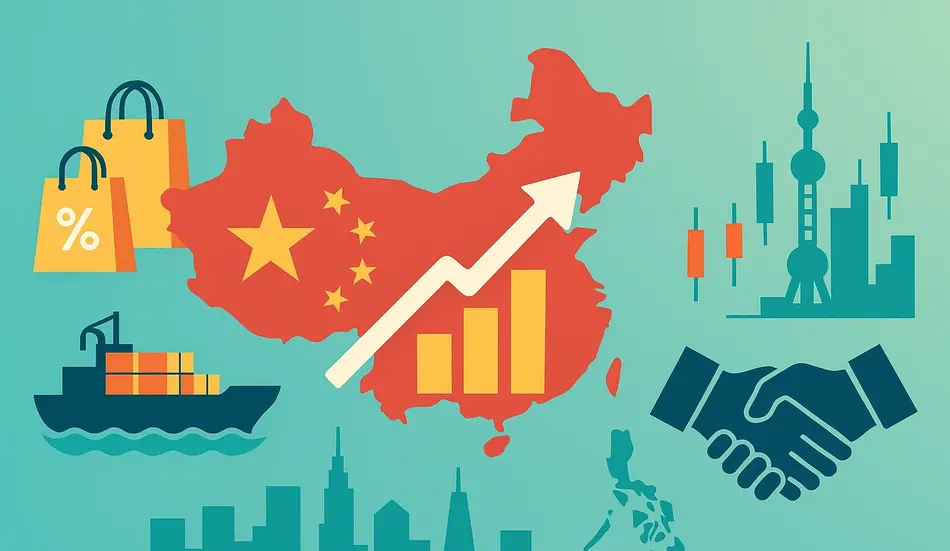Asian equity markets rallied strongly on Wednesday, powered by optimism over imminent U.S. interest rate cuts, upbeat corporate earnings in China, and new Beijing measures to spur consumer spending.
From Hong Kong’s tech-heavy benchmarks to Japan’s Nikkei 225, gains were broad-based, with investors weighing fresh macro signals against persistent geopolitical and trade headwinds.
Global Backdrop: Fed Rate Cut Bets Strengthen
Wall Street’s latest rally extended into Asia after U.S. inflation data showed price pressures cooling in line with expectations. Headline CPI was softer, reinforcing market bets that the Federal Reserve will cut rates at its September meeting.
Interest rate swaps priced in a 95–96% probability of a September cut, with some traders beginning to discuss the possibility of a larger 50-basis-point move if incoming jobs data were to disappoint sharply.
“Markets are leaning hard into the dovish Fed narrative,” said Helen Zhu, managing partner and CIO at NF Trinity, on Bloomberg Television. “If employment numbers deteriorate, there’s a chance policymakers may even accelerate the easing cycle.”
Asian Equities: Rally Broadens
The rally in Asia was broad-based.
- Hong Kong’s Hang Seng Index rose over 1%, led by tech and consumer names.
- Shanghai Composite reached its highest level since 2021, now less than 1% away from erasing all losses since that peak.
- Japan’s Nikkei 225 hit a fresh all-time high above 43,300, marking three consecutive days of strong gains.
- Taiwan’s Taiex and Indonesia’s Jakarta Composite both advanced, with Jakarta extending its best run in months.
Liquidity flows, particularly in mainland China, are playing a significant role. Households have been shifting funds from low-yield term deposits into equities, encouraged by ultra-low government bond yields and targeted policy support.
China’s New Consumer Loan Subsidy
Beijing’s biggest domestic policy headline of the day came from a joint briefing by the Ministry of Finance, People’s Bank of China, and other regulators. Officials announced an interest subsidy for eligible consumer loans to lower borrowing costs and stimulate household spending.
Key Details:
- Subsidy applies to loans under ¥50,000 for general consumption.
- Also covers big-ticket purchases above ¥50,000 in autos, education, and healthcare.
- Participating lenders include major state-owned banks, joint-stock commercial banks, and licensed consumer finance companies such as Ant Group and the World Bank.
- The program will take effect in September 2025.
The announcement sent shares of department stores, healthcare providers, and certain auto-related stocks sharply higher in mainland trading, with several hitting daily limit-ups.
Robin Xing, Morgan Stanley’s chief China economist, said the measure fits into Beijing’s gradual pivot toward demand-side support.
“These are small steps, but they’re moving in the right direction,” Xing noted. “The key now is to combine supply-side consolidation with meaningful consumption stimulus to create a durable reflation path.”
Persistent Deflation Risks
Despite stronger equity performance, economists warn that China’s economy still faces entrenched disinflationary forces. Consumer sentiment remains fragile, property prices are soft, and overcapacity persists in multiple industries.
Xing outlined three conditions for a durable exit from deflation:
- Broader price stabilization beyond upstream sectors, including core services CPI.
- Rising corporate profits and wages to support household income.
- Higher consumption share of GDP via stronger social safety nets.
Without these structural shifts, he cautioned, reflation will remain liquidity-driven rather than fundamentals-driven — the “water buffalo” market analogy Morgan Stanley uses to describe slow, liquidity-fed gains.
Corporate Earnings: Tencent in the Spotlight
Earnings season in China is in full swing, with investors closely watching bellwether tech names.
Tencent Music
- Shares jumped 13% after quarterly results beat expectations on both revenue and net profit.
- Citi cited stronger-than-expected performance in advertising and music subscriptions.
Tencent Holdings
- The group’s stock rose 2.4% ahead of results due later in the day.
- Investors are focused on:
- The gaming pipeline, including the upcoming launch of Valorant Mobile.
- Monetization of video account advertising.
- AI-related capital expenditure plans, particularly in light of restrictions on Nvidia’s advanced chips.
Analysts expect Tencent to post ~11% revenue growth, marking a third straight quarter of double-digit sales expansion.
Consumer Goods: Kweichow Moutai Disappoints
Premium liquor maker Kweichow Moutai reported its weakest sales and profit growth in years, blaming:
- Weak consumer demand.
- Government austerity measures curbing luxury spending.
At the company’s recent AGM, Moutai notably replaced its flagship baijiu with blueberry juice at official banquets to comply with new frugality guidelines — a symbolic sign of policy impact.
Bloomberg Intelligence expects Moutai to still hit its 9% revenue growth target for 2025, but warns upside beyond that is “appearing less palpable.”
Tech & Trade: Nvidia and China’s Chip Strategy
Bloomberg reported that Beijing has urged state-linked firms to avoid Nvidia’s downgraded H20 AI processors for government use, citing security concerns.
The guidance complicates U.S. hopes that relaxed export restrictions might boost Nvidia sales in China, though many Chinese companies still prefer Nvidia chips for certain applications.
Longtime Nvidia investor Ross Gerber said the move is unlikely to dent the company’s global growth story.
“China’s in a pickle,” Gerber said. “They can buy the lesser chips now or try to get top-tier models through other means. Either way, Nvidia remains central to the AI ecosystem.”
Local chipmakers saw modest gains on hopes of import substitution.
Trade Tensions: Tariffs and Anti-Dumping Actions
The day also brought several new trade-related developments:
- Japan launched anti-dumping investigations into Chinese and South Korean steel imports.
- China imposed a 76% tariff on Canadian rapeseed, escalating a dispute that had already seen 100% duties on canola oil.
- White House trade adviser Peter Navarro pushed back on Goldman Sachs research suggesting U.S. consumers bear most of the cost of tariffs, insisting foreign producers absorb the bulk of the hit.
Meanwhile, opinion columnists noted that Beijing may be willing to endure short-term pain to shape any future trade deal to its advantage, framing the dispute as a “protracted war” requiring patience and self-reliance.
Asia Markets Surge as China Moves to Boost Consumption
Earnings and trade tensions remain in focus as investor optimism rises
Post a Job Now →Hong Kong: IPO Market Booms, Property Struggles
Hong Kong’s IPO market has roared back to life in 2025, largely on the back of mainland Chinese firms seeking offshore capital for overseas expansion.
The Hong Kong Exchange has become one of the world’s top performers among listed bourses this year, outpacing Euronext, Brazil’s B3, and Canada’s TMX.
However, this resurgence risks attracting political backlash from Washington, where lawmakers increasingly question the city’s autonomy from Beijing.
Property Sector Still Weak
- Commercial real estate loans flagged as risky at HSBC’s Hong Kong unit surged to 73% of its portfolio.
- Office rents have fallen more than 20% since 2022, with vacancy rates at record highs.
- Residential rents, by contrast, are nearing 2019 peaks due to strong demand from mainland students and professionals.
Evergrande’s Delisting: End of an Era
China Evergrande Group announced its Hong Kong shares will be delisted, more than 18 months after trading was suspended.
Liquidators revealed the developer’s debt could be as high as $45 billion, far above the previously estimated $27.5 billion.
Evergrande’s collapse has become a symbol of China’s broader property bust, and its protracted liquidation remains in early stages. Upcoming court trials against founder Hui Ka Yan will be closely watched by creditors.
Social Unrest: Rare Protest in Sichuan
Hundreds of residents in Jiangyou, Sichuan province, clashed with police last week over the handling of a violent schoolgirl assault case.
Video of the attack — showing a 14-year-old beaten by several other girls — went viral, sparking outrage over authorities’ claim that the victim suffered only “mild” injuries.
Protests in China over social justice issues are rare; most public demonstrations are tied to economic grievances. Analysts say the incident underscores a growing distrust of local authorities’ transparency in handling sensitive cases.
Market Outlook: Liquidity vs. Fundamentals
While Chinese equities are riding a wave of liquidity-driven optimism, analysts caution that the divergence between weak macro fundamentals and rising share prices is stark.
Bank of America strategists, after recent client meetings, noted that investors remain concerned about:
- Possible U.S. sanctions over Chinese purchases of Russian oil.
- Escalating trade tensions with the West.
- The lack of a clear macro catalyst in the second half.
Helen Zhu of NF Trinity believes the rally’s sustainability hinges on a meaningful boost to consumer confidence, potentially via property market stabilization or stronger wage growth.
Bottom Line
Asian markets are entering a delicate phase:
- Short-term momentum is strong, powered by global rate-cut expectations, domestic liquidity, and targeted stimulus.
- Medium-term risks — from trade disputes to structural deflation — remain unresolved.
- Investor strategy is increasingly about balancing exposure to clear winners (tech, select consumer sectors) with caution on overvalued segments and policy-sensitive industries.
If Beijing’s gradual steps toward consumption support continue — and if the Fed delivers on rate cuts — Asia’s rally may extend. But without a decisive shift in fundamentals, the “water buffalo” market is likely to keep plodding rather than charging.
FAQs
1. What is China’s new consumer loan subsidy program?
It’s a policy that will partially cover interest payments on eligible personal loans to encourage household spending. Loans under ¥50,000 for general consumption qualify, as do larger loans for autos, education, and healthcare. The program starts in September 2025 and involves major state-owned banks, joint-stock banks, and licensed consumer finance firms.
2. Why are Chinese stock markets rallying despite weak economic data?
The rally is largely liquidity-driven. Households and institutions are shifting funds from low-yield deposits into equities, aided by low interest rates, policy support for certain sectors, and a strong dividend play in large-cap state-owned firms. Fundamentals like earnings growth remain uneven, so valuations are getting most of the boost from sentiment and capital flows.
3. How will the Nvidia chip restrictions affect Chinese tech companies?
Beijing has reportedly told state-linked firms to avoid Nvidia’s downgraded H20 AI processors for government use, citing security concerns. While this could benefit domestic chipmakers, many Chinese firms still prefer Nvidia products for certain applications. For Nvidia, global demand remains strong enough that the long-term growth story is intact.
4. What’s happening with Evergrande’s delisting?
China Evergrande Group will be removed from the Hong Kong Stock Exchange more than 18 months after trading was halted. Liquidators now estimate its debt could reach $45 billion, well above earlier figures. The delisting marks a symbolic end to the developer’s role as a flagship of China’s property boom, with liquidation proceedings still at an early stage.




